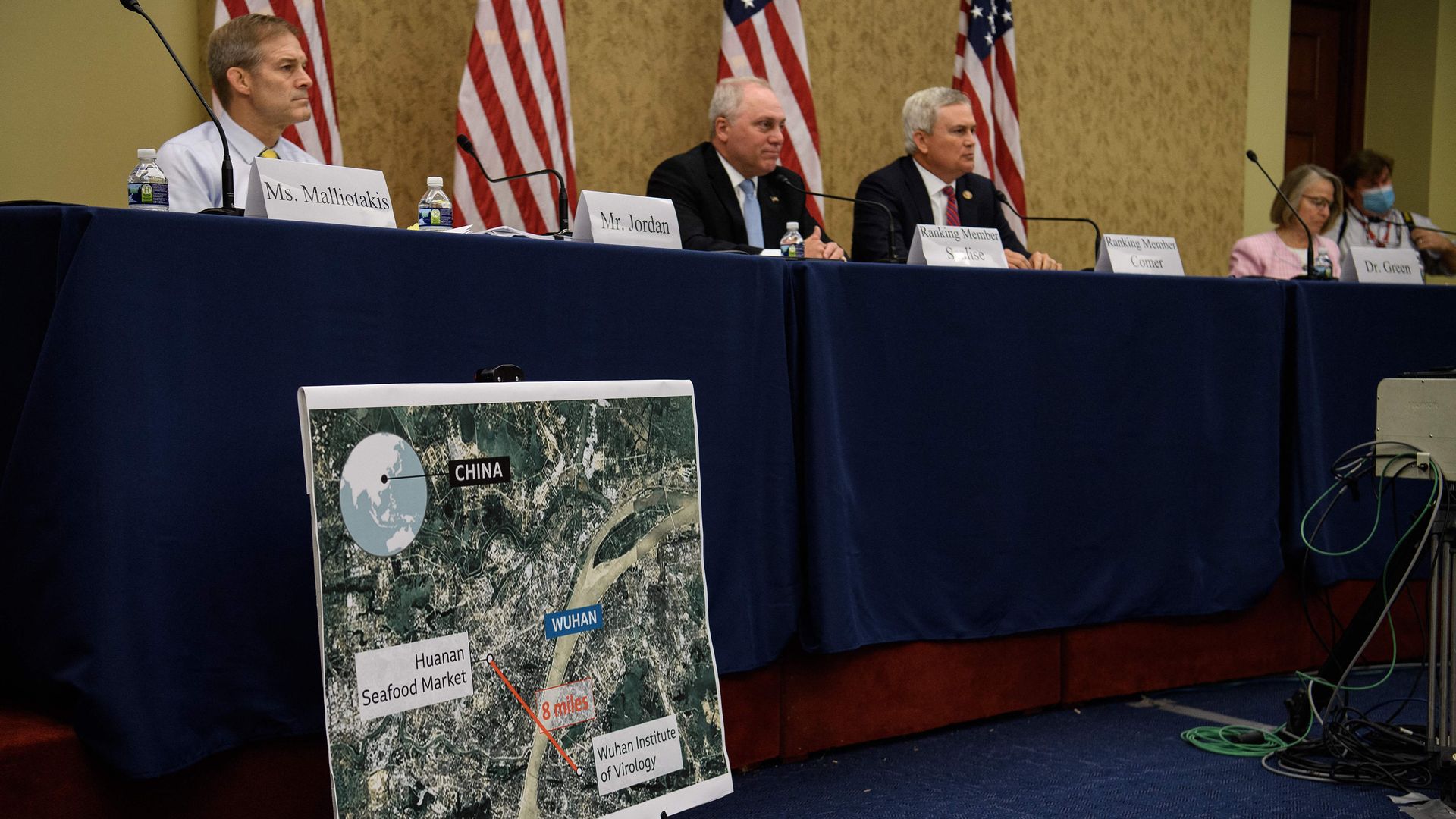| | | | | | | Presented By UnitedHealth Group | | | | Axios Sneak Peek | | By Alayna Treene and Hans Nichols ·Jun 29, 2021 | | Welcome back to Sneak. The pre-holiday push was on for the House and a traveling President Biden. ⚡ Situational awareness: Former President Trump will visit Weslaco, Texas, tomorrow for a border security briefing and tour of the border wall in the Rio Grande Valley. - "A Tennessee billionaire and high-dollar Republican donor is funding the deployment of South Dakota National Guard troops to the U.S.-Mexico border," Axios' Lachlan Markay reported.
Smart Brevity™ count: 1,218 words ... 4.5 minutes. Edited by Glen Johnson. | | | | | | 1 big thing: Destination fundraisers make summer comeback |  | | | Illustration: Aïda Amer/Axios | | | | Democrats have scheduled destination fundraisers — a mix of sun, fun and lobbying — on July weekends and throughout the August recess this summer, lobbyists who have been invited to the events tell Axios' Hans Nichols. Why it matters: The fundraising is set to take members out of Washington even as both chambers face difficult negotiations over the bipartisan infrastructure bill and any potential budget resolution. Both demands have the potential to affect their usual monthlong recess. - Destination fundraisers give lawmakers from both parties an incentive to find common ground and confine their disagreements to the workweek or postpone them until everyone returns to Washington in the fall.
- The House's last votes are scheduled for July 30, with the Senate planning to leave town after the first week of August.
What they're saying: "None of us like raising money, but it's what we have to do to stay in office," Rep. Dutch Ruppersberger (D-Md.) told Axios. - He's hosting a late August beach weekend in Ocean City, Maryland, where he was once a lifeguard.
- "People can bring their families, and it's very nice and it's only three hours away," he said. "You don't have to travel to California or other places."
- Sen. Kyrsten Sinema (D-Ariz.) is hosting an event in Sonoma, California, home to some of the country's finest vistas and vineyards, on the first weekend of August.
The examples detailed by Axios are not comprehensive. Republicans have their own events planned, and there are potentially many more events scheduled for both parties. - Democrats largely stopped hosting big-group fundraisers outside of Washington during the pandemic, leaving the field to Republicans.
- The GOP planned events, from beaches to the ski slopes, throughout COVID.
- For the Democrats who accept PAC contributions, it's time to play catch-up, as they work to collect donations from corporations and the lobbyists who represent them.
Keep reading. |     | | | | | | 2. Business leaders push bipartisan infrastructure deal |  | | | Illustration: Sarah Grillo/Axios | | | | Business leaders across the country are trying to insert themselves into the infrastructure debate, using whatever external power they possess to push lawmakers to pass the $1.2 trillion bipartisan deal, Hans and Axios' Alayna Treene report. Why it matters: Axios surveyed an array of business leaders and their statements, and from UPS to Siemens to Raytheon, everyone seems to want the deal to succeed — particularly since it doesn't include tax increases. - Blackstone global head of infrastructure Sean Klimczak said: "Renewed federal support in this area — combined with state, local and private investment — will create good-paying jobs and promote sustainable economic growth. We are proud to support this bipartisan framework."
- Bechtel CEO Brendan Bechtel said in a statement: "We are strongly supportive of the scope of this bipartisan framework to ensure our infrastructure can meet the needs and demands of our country and its dynamic economy for generations to come.
- Siemens USA CEO Barbara Humpton tweeted: "As a bipartisan infrastructure plan moves forward, we're encouraged to see a vision for investing in the power grid."
Axios Pro Rata writer Dan Primack said such backing makes sense: "It's all cake and no spinach." Between the lines: U.S. economic policy has constantly been in flux since the start of the pandemic and the transition between administrations. - Business leaders want stability so they can plan their futures.
- Infrastructure is largely seen as a most durable policy, as building roads and bridges and fixing potholes have long been considered bipartisan — and are incredibly popular with voters.
- Many businesses also are eager to come out publicly on a political issue that's widely popular with voters, following the blowback some suffered after yanking political donations to some Republican lawmakers following the Jan. 6 Capitol assault.
What they're saying: The Business Roundtable, the voice of America's top CEOs, has been focusing on applying pressure to the group of 21 senators who negotiated the bipartisan deal, as well as the Problem Solvers Caucus in the House. - This week it's rolling out an engagement plan that includes launching radio and digital ads in 52 media markets, plus the District of Columbia, urging support of the deal.
- Raytheon CEO Greg Hayes said this month: "We very much support the bipartisan efforts we've seen in Congress of late to come to a reasonable solution around how much we can afford to invest in infrastructure."
Keep reading. |     | | | | | | 3. By the numbers: Breaking down the bipartisan deal |  Data: The White House/National Economic Council; Chart: Axios Visuals The infrastructure agreement would unleash the largest amount of spending on U.S. infrastructure in decades. Driving the news: The president kicked off his sales effort today with a visit to Wisconsin, where he labeled the $579 billion plan a "blue-collar blueprint to rebuild America," Axios' Sarah Mucha writes. - It was his first public lobbying for the bill.
- He spent the weekend in damage-control mode, after saying he would sign it only if it was linked to a Democratic-backed proposal for less-traditional infrastructure spending, such as for child care and paid family leave.
Between the lines: Democrats are focusing on the Wisconsin Senate seat up for re-election in the 2022 midterms, making the infrastructure deal — and Biden's specific destination — important for their political prospects. |     | | | | | | A message from UnitedHealth Group | | Helping to create a modern, high-performing health system | | |  | | | | UnitedHealth Group is committed to expanding access to high-quality, affordable care that achieves better outcomes and enhances the health care experience. We are partnering to advance health equity and support the communities where we work and live. Learn more in our Sustainability Report. | | | | | | 4. ICE eyes new ways to track migrants |  | | | A migrant family awaits processing after crossing the Rio Grande last week. Photo: Brandon Bell/Getty Images | | | | The Biden administration is exploring ways to provide non-detention tracking and services for as many as 100,000 migrant families and 18- to 21-year-olds each year, according to a new government request, Axios' Stef Kight reports. Why it matters: The request for information by Immigration and Customs Enforcement (ICE) reveals the kinds of options the Biden administration is considering to avoid detaining migrants. - The administration has gotten flak for using the Trump-era Title 42 public health order to keep families and adults from entering the country on the basis of controlling the spread of the coronavirus.
- Axios previously reported the administration planned to eliminate Title 42 by July 31.
- Distinguishing 18- to 21-year-olds from the rest of the migrant single adult migrant population, as proposed by the contract request, is unusual.
- And beyond families and young adults, the program could be used for "other vulnerable populations," according to the ICE request.
Be smart: A request for information is an early part of the process, and ICE could decide not to award a contract. Between the lines: Many families who cross the border are released into the U.S. after passing an initial screening for asylum. - Some are tracked with cellphones or other devices, but otherwise, there's little to no enforcement to ensure they show up for their immigration court hearings.
What to watch: The proposed program could provide services to about 100,000 migrants a year in Boston, Orlando, San Antonio, El Paso, Houston, New York, Phoenix, Dallas, San Diego, Los Angeles, Chicago, Miami, Philadelphia, Denver, Detroit, Washington, D.C., and Baltimore, according to details in the request. - ICE also is looking for ways to provide low-cost or free legal representation to migrants and ensure school enrollment, as well as provide other resources to help them get situated in the U.S. while awaiting their court hearings.
- ICE already has an alternative-to-detention contract with a group owned by the for-profit prison company GEO Group. It can serve 90,000 to 100,000 people daily.
- One person familiar with the new request told Axios officials are looking for non-governmental organizations not affiliated with for-profit prisons to run the new program.
Keep reading. |     | | | | | | 5. Pic du jour |  | | | Photo: Nicholas Kamm/AFP via Getty Images | | | | Three Republican House members — Jim Jordan of Ohio, Steve Scalise of Louisiana and James Comer of Kentucky — held a hearing focused on determining the root cause of the COVID-19 pandemic. |     | | | | | | A message from UnitedHealth Group | | UnitedHealth Group's commitment to sustainability | | |  | | | At UnitedHealth Group, sustainability is an extension of our business strategy, culture and mission to: - Help create a modern, high-performing health system.
- Foster an inclusive and diverse culture.
- Maintain strong corporate governance.
- Minimize our environmental impact.
Learn more. | | | | 📅 Join Axios' Ina Fried tomorrow at 12:30pm ET for a virtual event about the Equality Act in Congress and the wave of anti-trans bills around the country. Guests include Rep. Sean Patrick Maloney (D-N.Y.), National LGBTQ Task Force executive director Kierra Johnson and the GenderCool Project's Stella Keating. Register here. 📬 Thanks for reading. A reminder your family, friends and colleagues can sign up for email delivery of this or any of Axios' other free newsletters through this link. |  | | It'll help you deliver employee communications more effectively. | | | | | | Axios thanks our partners for supporting our newsletters. If you're interested in advertising, learn more here.
Sponsorship has no influence on editorial content. Axios, 3100 Clarendon Blvd, Suite 1300, Arlington VA 22201 | | | You received this email because you signed up for newsletters from Axios.
Change your preferences or unsubscribe here. | | | Was this email forwarded to you?
Sign up now to get Axios in your inbox. | | | | Follow Axios on social media:    | | | | | |









No comments:
Post a Comment